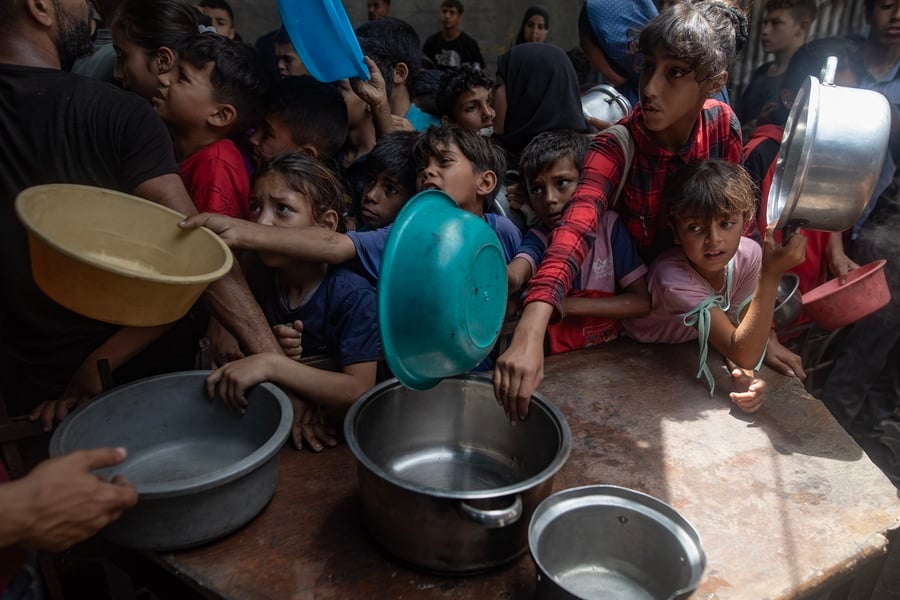

Greece has not signed a joint statement issued mostly by EU countries, demanding Israel to allow the full resumption of humanitarian aid into Gaza amid growing famine conditions in the war-torn territory.
“As humanitarian donors, we have two straight-forward messages to the Government of Israel: allow a full resumption of aid into Gaza immediately and enable the UN and humanitarian organizations to work independently and impartially to save lives, reduce suffering and maintain dignity,” the statement, issued by EEAS, the diplomatic service in charge of executing all international relations of the European Union.
The joint statement was signed by the foreign ministers of 24 countries -Austria, Australia, Belgium, Canada, Denmark, Estonia, Finland, France, Germany, Iceland, Ireland, Italy, Japan, Latvia, Lithuania, Luxembourg, the Netherlands, New Zealand, Norway, Portugal, Slovenia, Spain, Sweden and the UK. Cyprus also did not sign the joint statement.
On Monday, Israel announced it will allow a “basic amount of food” to enter Gaza, after a 10-week blockade has pushed the 2.1 million people living in the besieged strip on the verge of starvation.
“Whilst we acknowledge indications of a limited restart of aid, Israel blocked humanitarian aid entering Gaza for over two months,” the statement, also released on Monday, reads. “Food, medicines and essential supplies are exhausted. The population faces starvation. Gaza’s people must receive the aid they desperately need.”
The statement also rejects Israel’s proposed new aid distribution model, which reportedly excludes the UN and international NGOs, citing concerns about alleged links to Hamas.
Donor nations said the proposed system “places beneficiaries and aid workers at risk” and “links humanitarian aid to political and military objectives.”
Greece’s decision not to sign the EEAS statement has sparked outrage among Greek opposition parties, with PASOK leader, Nikos Androulakis, saying that Greece was absent from “this vast alliance of 17 EU member-states.”
“The tragedy of the ethnic cleansing that is unfolding before us in Gaza, the vast majority of EU countries supported the Dutch proposal that the EU starts discussing the amendment of the EU-Israel Interconnection Agreement, citing possible human rights violations,” he said. “We have an obligation towards the Greek people to always be on the side of international law and human rights.”
The Greek government says that “the statement is an isolated initiative by member states and not by the European Council.”
“Greece always provides support to humanitarian operations, especially to the suffering Gaza. It is reminded that Greece, after the Greek Minister of Foreign Affairs took the initiative, along with other member states welcomed sick children from Gaza to be hospitalized in Greek hospitals.”

In a statement, the office of Israeli Prime Minister Benjamin Netanyahu said the decision to allow limited aid into Gaza has been made to ensure that famine doesn’t develop in Gaza and that at the recommendation of the Israeli Defense Forces (IDF), Israel’s expanded military campaign in the territory is not jeopardized.
Netanyahu agreed to allow limited supplies to go into the war-ravaged strip after pressure from allies concerned about “images of hunger” which they “cannot accept.”
In a video statement posted on social media on Monday, the Israeli Prime Minister said “Israel’s greatest friends in the world” (without specifying them), had threatened to withdraw support for his country. He added that a “starvation crisis” would jeopardize Israel’s new offensive against Hamas in Gaza and that a “basic amount of food” would be allowed in.
Israel has not explained what a “basic amount of food” is, but it says any food deliveries would bypass Hamas.
A UN official told the Associated Press news agency that 20 aid trucks carrying mostly food would go into the territory.
Israel’s move comes amid multiple warnings by aid agencies of famine engulfing Gaza and under increasing international pressure to lift the blockade, under which, since March 2, no food, fuel or medicines have been allowed into the territory. Footage and accounts of emaciated children suffering malnutrition have been emerging since, with the World Health Organization (WHO) saying last week that the risk of famine among Gaza’s 2.1 million residents is increasing while a UN-backed report said that one in five people in the Gaza Strip are facing starvation.
